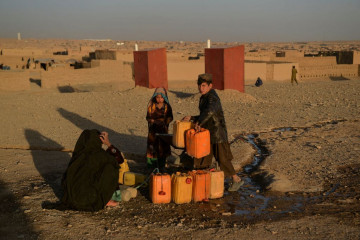

Climate change and refugee migration are two of the biggest challenges we are facing in the 21st Century. They are also strongly intertwined, so much so that the term ‘climate refugee’ is something that we will see more and more of in the near future.
However, there is a stark divide between those who cause climate change, and those who suffer from its effects. The clear divide spans across the Global South, where people of colour are those who will be most affected by climate change, despite their carbon footprint being so low.
By 2050, the Australian think tank the Institute for Economics and Peace predicts that at least 1.2 billion people could be displaced by climate-related events.
"Weather-related hazards – which are increasing in frequency and severity as a result of the climate crisis – have displaced over 21 million people each year on average, equivalent to 41 people every minute"
The UN secretary-general in 2021 named it the ‘make or break’ year to address the climate-energy crisis. Come 2022, little has changed. The United Nations Climate Change Conference (COP26) began at the end of October 2021, with a promise of reaching Net-Zero by 2030.
However, questions have been raised as to whether or not this is actually sustainable, as it is fair to say that the climate crisis discriminates.
While everyone around the world feels the effects of climate change, the most vulnerable are people living in the world’s poorest countries such as Haiti. Egypt is also extremely vulnerable to climate change, with the densely populated Nile at serious threat due to rises in sea levels.
Of all the MENA regions, Morocco tops as the country with the highest average annual precipitation, ranking number 153, with an average of 346mm of rainfall per year.
|
As Steve Trent, founder and CEO of Environmental Justice Foundation (EJF) highlights, “since 2008, weather-related hazards – which are increasing in frequency and severity as a result of the climate crisis – have displaced over 21 million people each year on average, equivalent to 41 people every minute. This figure does not include those forced to leave home due to slow-onset climate impacts, such as desertification and sea-level rise.”
Increasingly unpredictable weather patterns, shifting seasons and natural disasters disproportionately threaten these populations, endangering their livelihoods and increasing their risk of poverty and hunger.
Speaking exclusively to The New Arab, the Co-founder and CEO of WeForest, Marie-Noëlle Keijzer, says that “the vicious circle is deforestation, droughts and chaotic weather patterns which mean that crops don’t produce and feed people."
In MENA places like Syria, resource scarcity has been a long-standing challenge where it has reduced pasture and water sources. Climate change has accelerated migration and in return created a large inflow of refugees.
Noëlle Keijzer says that “every year is hotter than the previous one. We are breaking all records each year, the carbon curve is exponential."
"What is of concern, and needs to be addressed, is implementing measures to slow down and impede the process of refugees being displaced because of the climate"
As the latest IPCC report makes clear, we are heading towards increased global heating, which will exacerbate extreme weather, erode human rights, and make the conditions of life more difficult across large swaths of the planet. This is why we must turn to climate change conferences, such as the recent Cop-26 conference, to hold governments and people to account.
Amail Tower, the Founder and ED of Climate-Refugees highlights this. "As the latest Sixth Assessment of the IPCC report rightly indicates, the impact of climate change is driving displacement in all regions, but much of this is an internal movement within borders," she tells The New Arab. "Where this intersects between refugees and climate change, it disproportionately impacts frontline communities, marginalises people and Global South countries where livelihoods are dependent on natural resources and ecosystems for survival.”
What is of concern, and needs to be addressed, is implementing measures to slow down and impede the process of refugees being displaced because of the climate.
As Steve Trent says, it comes down to calling governments to account. “Governments must urgently move from words to real action for a full implementation of the Paris Agreement to keep global temperature rise to 1.5°C above pre-industrial levels,” he adds.
Campaigns officer at JCWI Mary Atkinson adds, "Governments need to act now to ensure that people can move across borders without risking their lives – and we as citizens must urge them to act with common sense and compassion.”
Milica Cosic is a freelance political journalist and holds an MSc in International Relations. She specialises in the refugee crisis in Europe, particularly Eastern Europe.
Follow her on Twitter: @milicac7




 Follow the Middle East's top stories in English at The New Arab on Google News
Follow the Middle East's top stories in English at The New Arab on Google News


